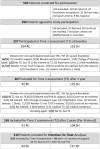Effectiveness of supported housing versus residential care in severe mental illness: a multicenter, quasi-experimental study
- PMID: 35041013
- PMCID: PMC9042980
- DOI: 10.1007/s00127-021-02214-6
Effectiveness of supported housing versus residential care in severe mental illness: a multicenter, quasi-experimental study
Abstract
Purpose: Up to now there are only few studies and no RCT comparing efficacy or effectiveness of supported housing (SH) versus residential care (RC) in severe mental illness (SMI) without homelessness. Here we present an observational follow-up study in SMI subjects, who entered SH or RC, to compare clinical and functional outcomes 2 years later.
Methods: In this prospective study in more than 30 locations throughout a German federal state, we included SMI subjects, who entered SH (n = 153) or RC (n = 104). About one quarter suffered from each substance use, psychotic, affective, or other disorders. To avoid sampling bias, we used the propensity score matching method to establish a quasi-experimental design. Outcome measures were social functioning (SFS), the number of psychiatric hospitalisations, psychopathology (SCL-9-K), and quality of life (MANSA). Apart from descriptive methods we analysed primarily using repeated-measures ANOVAS.
Results: Our analyses revealed significant effects of time for all outcomes in both study groups. However, there were not any group differences of outcome measures, i.e., not any significant effects of group or interactional effects of group x time. Moreover, these results hold true for intent-to-treat and per-protocol sample analyses.
Conclusion: The results show, that SH and RC for non-homeless people with SMI achieve the same clinical and psychosocial outcomes across a 2-year period. Taking into account the users' preferences, the present findings should give reason to ensure the availability of affordable housing and to support the expansion of supported housing approaches.
Keywords: Health services, Supported accommodation; Psychiatric rehabilitation; Social functioning.
© 2022. The Author(s).
Conflict of interest statement
The authors declare that they have no conflict of interest.
Figures
Similar articles
-
A comprehensive review of prioritised interventions to improve the health and wellbeing of persons with lived experience of homelessness.Campbell Syst Rev. 2021 Jun 24;17(2):e1154. doi: 10.1002/cl2.1154. eCollection 2021 Jun. Campbell Syst Rev. 2021. Update in: Campbell Syst Rev. 2019 Sep 12;15(3):e1048. doi: 10.1002/cl2.1048. PMID: 37131928 Free PMC article. Updated. Review.
-
Independent Supported Housing vs institutional housing rehabilitation settings for non-homeless individuals with severe mental illness - longitudinal results from an observational study.BMC Psychiatry. 2024 Aug 9;24(1):554. doi: 10.1186/s12888-024-05995-7. BMC Psychiatry. 2024. PMID: 39123200 Free PMC article.
-
Psychosocial Outcomes of Supported Living for People with Severe Mental Illness: A One Year Evaluation of Floating Outreach in Germany.Community Ment Health J. 2025 May;61(4):754-763. doi: 10.1007/s10597-024-01400-5. Epub 2024 Dec 4. Community Ment Health J. 2025. PMID: 39630166 Free PMC article.
-
Independent Housing and Support for non-homeless individuals with severe mental illness: randomised controlled trial vs. observational study - study protocol.BMC Psychiatry. 2020 Jun 19;20(1):319. doi: 10.1186/s12888-020-02712-y. BMC Psychiatry. 2020. PMID: 32560681 Free PMC article.
-
Systematic reviews of the effectiveness of day care for people with severe mental disorders: (1) acute day hospital versus admission; (2) vocational rehabilitation; (3) day hospital versus outpatient care.Health Technol Assess. 2001;5(21):1-75. doi: 10.3310/hta5210. Health Technol Assess. 2001. PMID: 11532238 Review.
Cited by
-
Independent Supported Housing Versus Institutionalised Residential Rehabilitation for Individuals with Severe Mental Illness: A Survey of Attitudes and Working Conditions Among Mental Healthcare Professionals.Community Ment Health J. 2023 Apr;59(3):531-539. doi: 10.1007/s10597-022-01037-2. Epub 2022 Oct 13. Community Ment Health J. 2023. PMID: 36227518 Free PMC article.
-
Independent Supported Housing for non-homeless individuals with severe mental illness: Comparison of two effectiveness studies using a randomised controlled and an observational study design.Front Psychiatry. 2022 Nov 10;13:1033328. doi: 10.3389/fpsyt.2022.1033328. eCollection 2022. Front Psychiatry. 2022. PMID: 36440393 Free PMC article.
-
Targeted interventions to improve the social and economic circumstances of people with mental ill-health from marginalised communities: a systematic review.Psychol Med. 2025 Jul 28;55:e217. doi: 10.1017/S0033291725101128. Psychol Med. 2025. PMID: 40717551 Free PMC article.
-
Participating in Longitudinal Observational Research on Psychiatric Rehabilitation: Quantitative Results From a Patient Perspective Study.Front Psychiatry. 2022 Feb 4;13:834389. doi: 10.3389/fpsyt.2022.834389. eCollection 2022. Front Psychiatry. 2022. PMID: 35185660 Free PMC article.
-
Life is better but not without challenges: experiences following discharge from community-based residential mental health rehabilitation-a qualitative content analysis.Soc Psychiatry Psychiatr Epidemiol. 2025 Jan;60(1):95-111. doi: 10.1007/s00127-024-02716-z. Epub 2024 Jul 16. Soc Psychiatry Psychiatr Epidemiol. 2025. PMID: 39012385 Free PMC article.
References
Publication types
MeSH terms
LinkOut - more resources
Full Text Sources
Medical
Research Materials
Miscellaneous



